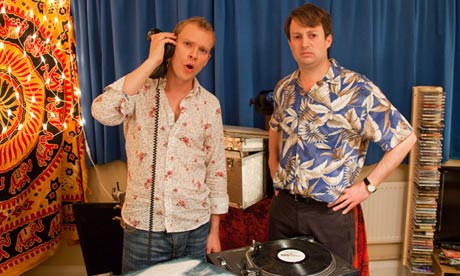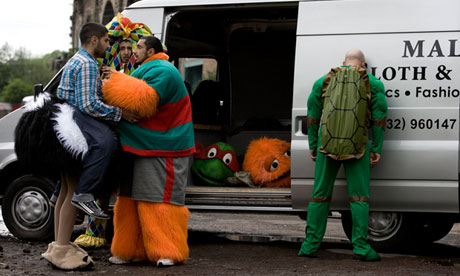10 tips on writing a screen play by Sam Bain, the comedy writer whose work includes Peep Show and the Four Lions film.
I will have to write loads of drafts of a script. But before that i am going to rush through my first one because i will be too scared to look over any mistakes and horrible ideas. Once i get to the end and must read what i have written, i should leave myself time inbetween so i can absorb my ideas. As good as i think my idea may be, it's always good to reevaluate it and improve it, in addition to this getting other opinions is always helpful. I must bare in mind that however good i think my script is, i am definitely still in the learning process and not as good as experienced writers.
I have never been good with deadlines especially with scripts because its a creative activity and its not something that i feel needs to be rushed, therefore, i have to give myself loads of time. This will allow myself to not resent deadlines. I am quite a methodical person so i struggle with throwing ideas down, instead, i try and think of getting from a, to be, to c etc. Therefore, i must take a different approach and create a bigger picture to begin with so that the smaller details/scenes can be placed easier at a later point.

Get drunk on arrogance ... Peep Show, of which Sam Bain was co-creator.
1. Your first draft will never ever be your last. Unless you're directing, producing and paying for the film or series yourself – in which case, may God have mercy on your soul. You will end up rewriting the bloody thing five, 10, 100 times. Whatever the total number of drafts you eventually reach, the only guarantee is that it will be at least two (and possibly 200) more than you thought were strictly necessary.
2. Forget point 1. When you're writing that all-important first draft, treat it like the last draft you'll ever write. Why? Because there's no quicker way to kill off creativity than the thought: "That'll do." Pretend this weak baby gazelle of a script – spindly legs burdened by the weight of expectation, inexperience and its own tortured story logic – is the best it's ever going to be. Give it everything you've got. That's the only way it will be anywhere near good enough to earn its passage to the second round of the endless Script Olympics.
3. There are two distinct roles you must play in the writing process: writer and reader. When I'm writing I move constantly, like a shark, never reading over what I've written out of fear that its total awfulness will sap my self-belief and I'll never get to the end. And getting to the end is everything. No one ever had two-thirds of a script produced (although some would argue that George Lucas achieved this not once, but three times).
4. Once a draft is done, it's time to take off the writing hat (the racing helmet worn to protect the wearer from dangerously high typing speeds) and don the reading hat (the deerstalker in which one can comfortably absorb a good yarn). Leave as long as you can between hat-changes. It takes a generous cushion of time to forget all the great reasons why super-criminal Toby Nutkins just has to be wearing red trousers when he's confronted by the Beagle – and see him instead as an annoying character worthy of being attacked with a hatchet and a cry of: "Who wrote this shit?"
 Write like, er, a shark ... Four Lions
Write like, er, a shark ... Four Lions
5. Writing any script – especially your first – is an act of unparalleled arrogance. "Here I sit, Josephine Shithead, preparing to join the hallowed ranks of the Coen brothers, Lena Dunham and the guys behind the Scary Movie franchise by writing a script. A script so goddamn great it will pole-vault its way over the scripts written by all the other shitheads who think they are the real deal when in fact they are not. Whereas I, on my very first try, quite definitely am." It is essential to be drunk on a neat shot of 100%-proof arrogance while writing. A balanced view of one's own capabilities and the odds against success would mean the balloon of self-confidence deflating halfway through the first scene, leaving nothing but the low pathetic hiss of dead ambition.
6. But that neat shot is strictly for First Draft Guy. First Draft Guy can be as arrogant as Han Solo, but subsequent drafts need to be written with the humility of Yoda. Otherwise you'll be just another shithead with a terrible script he thinks is great. And Lord knows we don't need any more of those.
7. Professional writers must make friends with deadlines. But without deadlines – when no one is waiting for you to deliver your script, or frankly gives a fig whether you finish at all – you need contingencies …
8. So create artificial deadlines. Much like a six-year-old who imagines if they step on the cracks in the pavement a bear will attack them, pretend that if you don't finish a scene by the end of the day, a bear will attack you. If you don't find a bear attack convincing, go for a different threat. Try: "If I don't finish this scene by 5 o'clock, I am an utter failure as a human being."
9. Problems start when these fear tactics work too well. You find yourself typing sweatily, looking down the barrel of a lifetime of self-hate you have so enthusiastically promised yourself, unable to write anything half-decent. To work, the brain needs to be supple, not clenched. You may find that taking a walk in the park is as crucial to your creativity as banging away on a keyboard. Just as long as the walk doesn't end in the pub/crackhouse.
10. If you are tempted to run away after all this, remember: the bear will find you. Not a metaphorical bear, the actual bear you hired me to bring round at 5 o'clock – remember?
No comments:
Post a Comment